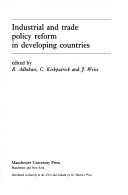Studies in Contemporary Development Studies S.
1 total work
Industrial and Trade Policy Reform in Developing Countries
by Ramesh Adhikari and etc.
Published 9 July 1992
The 1980s was a decade in which many developing countries adopted major programmes of economic policy reform, often as part of a structural adjustment effort. This volume examines the performance outcomes that have followed from the implementation of policy changes by countries in the developing world, focusing particularly on the trade and industry sectors. Trade policy is generally recognized as having a major influence on the pattern and pace of industrial development, and has been a key component of the economic adjustment programmes adopted by many Third World countries in recent years. Both trade and industrial policy reform have featured prominently in the conditionality attached to World Bank lending for structural adjustment. The effects of policy reform continue to be disputed, however, on both theoretical and empirical grounds. Critics argue that there are no firm grounds for believing that trade liberalization will increase the growth rate of the industrial sector; to the contrary, they argue that protection of infant industries can raise economic growth.
Again, it is suggested that in designing reform programmes the advocates of trade liberalization have typically given insufficient attention to the unique economic characteristics of the reforming economy. Finally, the empirical evidence that has accumulated over the past 10 years of policy reform has been interpreted in very different ways. For some, it confirms the benefits of policy reform, for other observers the gains are less obvious. These issues are examined in this volume. The chapters in Part One offer a cross country, overview perspective on the effects of trade and industrial policy reform. The remaining sections provide detailed country studies: Part Two focuses on Sub-Saharan Africa, and Part Three considers the policy reform experience in Asia. The chapters in this volume were originally presented and discussed at a conference on "The Impact of Policy Reform on Trade and Industrial Performance in Developing Countries", held at the Development and Project Planning Centre, University of Bradford, and organized by the Development Studies Association's Industry and Trade Study Group.
Financial support for this conference was received from the UK Overseas Development Administration (ODA), The British Council, The Nuffield Foundation, the University of Bradford Research Fund, the Development and Project Planning Centre, and the Development Studies Association. This volume is in turn part of a larger research programme on trade liberalization and industrial performance in developing countries.
Again, it is suggested that in designing reform programmes the advocates of trade liberalization have typically given insufficient attention to the unique economic characteristics of the reforming economy. Finally, the empirical evidence that has accumulated over the past 10 years of policy reform has been interpreted in very different ways. For some, it confirms the benefits of policy reform, for other observers the gains are less obvious. These issues are examined in this volume. The chapters in Part One offer a cross country, overview perspective on the effects of trade and industrial policy reform. The remaining sections provide detailed country studies: Part Two focuses on Sub-Saharan Africa, and Part Three considers the policy reform experience in Asia. The chapters in this volume were originally presented and discussed at a conference on "The Impact of Policy Reform on Trade and Industrial Performance in Developing Countries", held at the Development and Project Planning Centre, University of Bradford, and organized by the Development Studies Association's Industry and Trade Study Group.
Financial support for this conference was received from the UK Overseas Development Administration (ODA), The British Council, The Nuffield Foundation, the University of Bradford Research Fund, the Development and Project Planning Centre, and the Development Studies Association. This volume is in turn part of a larger research programme on trade liberalization and industrial performance in developing countries.
